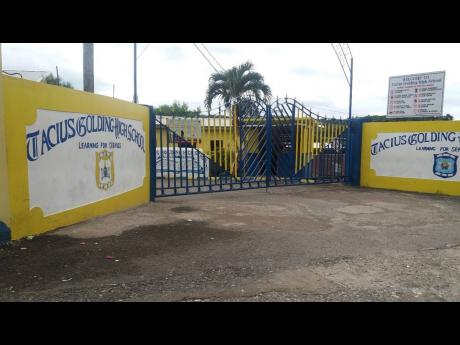Tacius Golding High on a ‘device drive’ to help students with online learning
Similar to other schools across Jamaica, students at Tacius Golding High School are dealing with the challenges of not having the critical electronic devices for online education – but the institution has a plan to address that.
With many students seemingly severed from the lifeline of education due to lack of technological devices or Internet connectivity issues, especially among schools in the rural areas, the technical-vocational department teachers at the school decided to take matters into their own hands by having a ‘device drive’ in the hope that it will make a big difference in the lives of the students, especially the ones being prepared for external examinations next year.
The Ministry of Education, Youth and Information has mandated online learning primarily through Google Learning Management System (LMS), with thousands of email addresses created for students and teachers throughout the island and many already having access.
LACK OF RESOURCES
For Tacius Golding High School, which is nestled in the rural area of Brown’s Hall in St Catherine, many of its students are unable to carry on with their lessons in the online environment as their number-one complaint is a lack of resources necessary to access the educational applications and platforms.
According to the school administration, of the enrolled population of 1,129 students, 488 students have activated Google Classroom, approximately 43 per cent of the school’s population. The remaining 57 per cent have poor Internet connectivity or the lack of a device to engage in the online delivery of their education. The majority seem to contend with frustrating resources, such as unreliable devices, having to share limited devices during competing school hours, or Internet connectivity woes that disable the streaming of live classes.
“Currently, there are around 600 students on the Programme of Advancement Through Health and Education (PATH) at the institution, and a majority of those are unable to participate in any online learning. The Ministry of Education has promised a planned distribution of tablets, and, therefore, students of PATH are expected to access the much-needed devices,” explained the school’s senior guidance counsellor, Marie Pitterson-Coke.
“However, since the procurement process is still ongoing, that activity is not yet a reality, and many are missing out.”
Commenting on the daily struggles being faced by parents in manoeuvring their daily expenses and the educational environment, Pitterson-Coke said it is a challenge for those who mainly farm for their living.
“Many are from farming communities, therefore, purchasing a device for educational use is almost far-fetched, especially given factors such as loss of jobs due to COVID-19, inefficient salaries, and the exorbitant prices of the devices due to demand of educational equipment,” she said, stressing the urgency for a drive such as the one they have launched.
It is with that in mind that the appeal is being made for those who can donate used or new laptops or tablets to the school so that students can benefit from them.
FEAR FOR THE BOYS
Highlighting the dire need for the devices, principal of the institution, Lena Russell, pointed out that one family with three school-aged children is completely left behind.
“The only device present in their household is a radio, with no cell phone or even a television set needed to access aired educational programmes. For other families who struggle with the issue of one device, preference is usually given to students who attend traditional high schools or students who are sitting external exams such as the Caribbean Examinations Council (CXC),” she said.
Added to the challenge, she noted, the school is not in any position to accommodate students who lack devices as the computer labs have limited computers, which are closely situated, and would not comply with COVID-19 social-distancing measures. Furthermore, the teachers utilise those resources when they, too, suffer from dysfunctional resources such as lack of working devices, Internet connectivity issues, or disruptions within their personal space.
The team of hard-working teachers of the technical-vocational department is very concerned about their students accessing classes and even more concerned since about 65 per cent of the school population are boys, leading to the fear of losing them to the elements of their environment.

